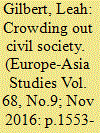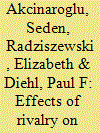| Srl | Item |
| 1 |
ID:
141479


|
|
|
|
|
| Summary/Abstract |
In contrast to similar organizations in its neighbouring countries, Niger's domestic Salafi associations have remained peaceful and apolitical. Drawing on historical institutionalist scholarship and on recent conceptualizations of the state as a religious actor, this article examines how the Nigerien state has tried to regulate religious practices since Seyni Kountché's military coup in 1974. It argues that the institutional regulation of religious practices is one important variable that accounts for Niger's deviant trajectory. During Niger's autocratic period (1974–91), the government established the Association islamique du Niger (AIN) as the sole legal authority regulating access to Niger's Friday prayer mosques. Committed to peaceful and apolitical interpretations of the Koran, the AIN confined access to Niger's religious sphere to local clerics and Sufi brotherhoods. After the breakdown of autocratic rule in 1991, the AIN served as a religious advisory body. Salafi associations could assemble freely but had to abide by certain criteria. Confronted with the prospect of Islamic violence in 2000, the Nigerien state intervened in Niger's religious sphere in several ways. Among other initiatives, the government began to resurrect a more rigorous system of religious supervision in order to monitor religious practices on an ongoing basis.
|
|
|
|
|
|
|
|
|
|
|
|
|
|
|
|
| 2 |
ID:
148822


|
|
|
|
|
| Summary/Abstract |
There is considerable debate about the impact of the 2006 NGO Law and related Kremlin policies on social organisations in Russia. This article uses interviews with members of organisations focusing on human rights, women, and youth to assess the effects of these policies on civil society. It finds that groups that are critical of the regime have been systematically pushed out of the public sphere and supplanted by groups that are either neutral to, or in favour of, the regime. This finding has implications for the future development of Russian civil society and demonstrates a way that non-democratic rule has been ‘upgraded’ in Russia.
|
|
|
|
|
|
|
|
|
|
|
|
|
|
|
|
| 3 |
ID:
131057


|
|
|
|
|
| Publication |
2014.
|
| Summary/Abstract |
The paper investigates how states manage multiple rivalries when faced with immediate threats. We argue that accommodation of one rival allows states to shift resources from the management of another rival to deal with the costs of immediate threats. By examining enduring rivalries from 1966 to 1999, we show that states' reliance on accommodation in response to threats varies depending on the number of severe threats and the relative capabilities between the states and the threat-issuing rivals. Findings show that when faced with severe but few threats, states prefer to accommodate rivals that did not issue the threat. They are also more likely to give larger concessions to such rivals and to those issuing less severe threats. Finally, the greater the military capability of a rival issuing a severe threat relative to that of the challenged state, the more likely that a threatening rival is accommodated.
|
|
|
|
|
|
|
|
|
|
|
|
|
|
|
|